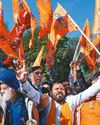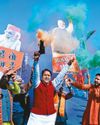
PRACTICING democracy by nation-states in the real world is seen, of late, to be guided more by their own pathologies than by their perseverance. More citizens are getting disgusted by its observable pathos of public rhetoric and barbed emotions, and there seems to be a growing cynicism to the core features of democratic ethos itself. Democracy has unfolded with a lot of emotional and psychic baggage, and in the present conditions of denials, we, as a nation, need to be careful of what we aspire for.
One of democracy's smothering emotions is its capacity and propensity to generate enormous amounts of hate, fear and rage in its polity and in society, especially on the basis of the majority-minority binary. To cobble up a working majority for government formation, political parties appeal to the core sensibilities of ethno-political emotions of the voters and produce new forms of hatred, and sometimes extreme forms of ethnocidal and communal violence. Counting of 'us' and 'them', this sort and that sort of people in a given territory, demography, enumeration and representation, all of these become the repeat motifs of community-building exercises. The strange inner tensions of the categories of majority' and 'minority' yield to the 'angst of deficiency or lack' and drive the majorities into conditions favourable to paroxysms of violence against the minorities. In India, it is this sense of incompleteness that finds its cause in Islamophobia-the fear of Islam and the core of Hindutva politics of hate and intimidation of Indian Muslims.
Institutionalisation of Islamophobia
Bu hikaye Outlook dergisinin 21 July 2023 sayısından alınmıştır.
Start your 7-day Magzter GOLD free trial to access thousands of curated premium stories, and 9,000+ magazines and newspapers.
Already a subscriber ? Giriş Yap
Bu hikaye Outlook dergisinin 21 July 2023 sayısından alınmıştır.
Start your 7-day Magzter GOLD free trial to access thousands of curated premium stories, and 9,000+ magazines and newspapers.
Already a subscriber? Giriş Yap

Friendship Loveship Hateship
The world is presently battling a loneliness epidemic, but it’s the well-connected’ who are the loneliest. These days, they are looking to make connections at social meet-ups

Scripting Loneliness
With the turn of the millennium, Indian audiences got to see what actually happens when fairytale romance ends and life begins on the big screen

Confined, Constricted
Love and loneliness co-exist in spaces where desires struggle to navigate through narrow lanes, love flounders to flourish in tiny homes and heart-to-heart conversations get muted in the cacophony of everyday drudgery

Rusted Ruins
Archaeology trapped in jingoist trenches

BJP's Delhiverance
The double engine sarkaar will have to show some quick results to Delhi's middle class which has trusted it to improve the city’s infrastructure

AAP Rejected, or BJP Elected?
ls the electorate voting to reject rather than voting to elect?

Crying in Love is to Grow in Love
To be in love is to check one's mortality and start with the quiver of optimism

Half Moon
Desire is not Just about the body but the entire world through the body. In fact, the world becomes the body of the absent lover

Love, Actually
British novelist and scriptwriter David Nicholls is the author of six novels, including the global bestseller One Day (2009).

Big City Blues
Queer people find vibrancy and welcome anonymity in megacities but there is a limit to the choices they offer